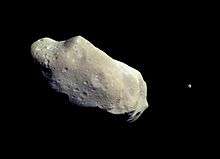Definify.com
Webster 1913 Edition
Asteroid
As′ter-oid
,Webster 1828 Edition
Asteroid
AS'TEROID
,Definition 2026
Asteroid
Asteroid
German
Noun
Asteroid m (genitive Asteroiden, plural Asteroide)
Declension
| singular | plural | ||||
|---|---|---|---|---|---|
| indef. | def. | noun | def. | noun | |
| nominative | ein | der | Asteroid | die | Asteroide |
| genitive | eines | des | Asteroiden | der | Asteroide |
| dative | einem | dem | Asteroiden | den | Asteroiden |
| accusative | einen | den | Asteroiden | die | Asteroide |
asteroid
asteroid
English

Noun
asteroid (plural asteroids)
- (astronomy) A naturally occurring solid object, which is smaller than a planet and is not a comet, that orbits a star
- (astronomy) In the Solar system, such a body that orbits within the orbit of Jupiter
- 2007, Hannu Karttunen et al., editor, Fundamental Astronomy, 5 edition, page 131:
- The orbital planes of asteroids, minor bodies that circle the Sun mainly between the orbits of Mars and Jupiter, are often more tilted ...
-
- (zoology) Any member of the taxonomic class Asteroidea; a starfish
Usage notes
The term "asteroid" has never been precisely defined. It was coined for objects which looked like stars in a telescope but moved like planets. These were known from the asteroid belt between Mars and Jupiter, and were later found co-orbiting with Jupiter (Trojan asteroids) and within the orbit of Mars. They were naturally distinguished from comets, which did not look at all starlike. Starting in the 1970s, small non-cometary bodies were found outside the orbit of Jupiter, and usage became divided as to whether to call these "asteroids" as well. Some astronomers restrict the term "asteroid" to rocky or rocky-icy bodies with orbits up to Jupiter. They may retain the term planetoid for all small bodies, and thus tend to use it for icy or rocky-icy bodies beyond Jupiter, or may use dedicated words such as centaurs, Kuiper belt objects, transneptunian objects, etc. for the latter. Other astronomers use "asteroid" for all non-cometary bodies smaller than a planet, even large ones such as Sedna and (occasionally) Pluto. However, the distinction between asteroid and comet is an artificial one; many outer "asteroids" would become comets if they ventured nearer the Sun. The IAU terminology since 2006 has been small Solar System body for any body that orbits the Sun directly and whose shape is not dominated by gravity.
Derived terms
Related terms
Translations
|
|
See also
Estonian
Noun
asteroid (genitive [please provide], partitive [please provide])
Inflection
This noun needs an inflection-table template.
Romanian
Etymology
Borrowing from French astéroïde.
Noun
asteroid m (plural asteroizi)
Declension
| singular | plural | |||
|---|---|---|---|---|
| indefinite articulation | definite articulation | indefinite articulation | definite articulation | |
| nominative/accusative | (un) asteroid | asteroidul | (niște) asteroizi | asteroizii |
| genitive/dative | (unui) asteroid | asteroidului | (unor) asteroizi | asteroizilor |
| vocative | asteroidule | asteroizilor | ||
Slovene
Pronunciation
- IPA(key): /astɛrɔˈíːt/
- Tonal orthography: asteroȋd
Noun
asteroíd m inan (genitive asteroída, nominative plural asteroídi)
Declension
Swedish
Pronunciation
- Rhymes: -iːd
Noun
asteroid c
Declension
| Inflection of asteroid | ||||
|---|---|---|---|---|
| Singular | Plural | |||
| Indefinite | Definite | Indefinite | Definite | |
| Nominative | asteroid | asteroiden | asteroider | asteroiderna |
| Genitive | asteroids | asteroidens | asteroiders | asteroidernas |